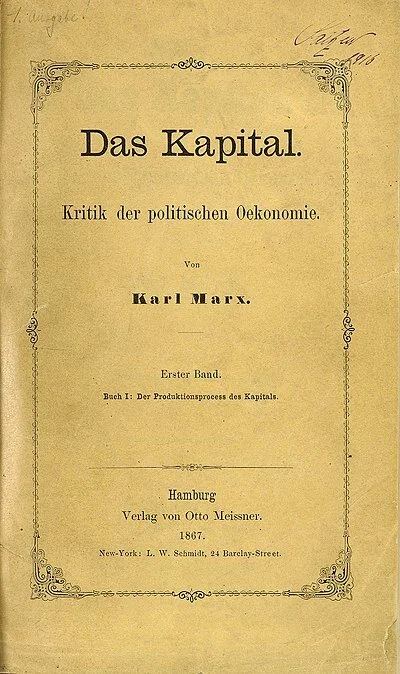First edition of Karl Marx’s Capital: A Critique of Political Economy (1867)
SOMERVILLE, Mass.
What have been the dominating economic events of the first 20 years of the 21st Century? The financial crisis of 2008 was surely one. The advance of global warming is another. With the rise of China, India and Brazil, the configuration of great powers has become uncertain, and with it the future of international trade.
The appearance of an important book may also qualify for inclusion on such a list. I am thinking of Capital in the Twenty-First Century, by Thomas Piketty, which seeks to return to economics a preoccupation with distribution and equality. If it belongs, so probably does a second book of history, by Nobel laureate Angus Deaton. The Great Escape: Health, Wealth, and the Origins of Inequality, received less attention than did Piketty’s tome, but Deaton’s account of economic growth as a source of well-being represents the other side of the argument about distribution.
A new journal, Capitalism: A Journal of History and Economics, has appeared to examine these issues, and others, in a consistently new light. On its appearance hangs a story.
“It is a journal born out of scholarly disagreement,” wrote editor Marc Flandreau in the first issue, “and, as a result, it is a journal whose primary mission is to keep disagreement alive.” The publication aims to foment a new approach to economic history, Flandreau says, “engaged across borders, unruly and free.”
The first issue appeared a year ago. The second issue arrived last autumn. The third issue went into the mail last week. Its contents will remain free online here for another week. Articles by up and-comers are interspersed with pronouncements by well-established authorities: Barry Eichengreen, Gary Gorton, Harold James, Emma Rothschild, François Velde. A previously unpublished review by the late Charles P. Kindleberger is slated for a future issue.
Co-editors in an “editorial collective” are Julia Ott, of The New School, Francesca Trivelatto, of the Institute for Advanced Study, in Princeton, and Carolyn Biltoft, of the Graduate Institute for International and Development Studies, in Geneva. An advisory board lends prestige. Editor Flandreau is the chair of economic history in the history department of the University of Pennsylvania. He is editor of an interesting collection, Money Doctors: The Experience of International Financial Advising 1850-2000 (2004); and author of two books: The Glitter of Gold: France, Bimetallism, and the Emergence of the International Gold Standard 1848-1873 and Anthropologists in the Stock Exchange: A Financial History of Victorian Science (2016).
I might not have brought up Capitalism: A Journal of History and Economics if I weren’t reading a biography, Eric Hobsbawm: A Life in History, by Richard J. Evans. As Evans writes, Hobsbawm was, at the time of his death, in 2012, the best-known and most widely read historian in the world. A life-long Marxist, he was author of a spell-binding trilogy on the dual revolutions, political and industrial, that helped make the 19th Century: The Age of Revolution: 1789-1848; The Age of Capital: 1848-1875; The Age of Empire: 1875-1914.
An equally strong claim was Hobsbawm’s leading role in founding, in 1952, Past and Present, an English journal, itself inspire by the French journal Annales, founded in 1929 by Marc Bloch and Lucien Febvre, and intended, as Hobsbawm later wrote, “for the new, post-war generation of historians for whom, Marxist or not, economic and social dimensions of history were more important than before….” All members of the editorial board read all submissions to the journal, to work out differences between Marxist and non-Marxist historians; gradually divergences diminished. Social history blossomed in its pages,
A great deal has changed in the last quarter-century. Where there is action going forward, I expect Capitalism: A Journal of History and Economics will find it. Evidence of its perspicacity will emerge over time.
David Warsh, an economic historian and a veteran columnist, is proprietor of Somerville-based economicprincipals.com.
© 2021 DAVID WARSH, PROPRIETOR











